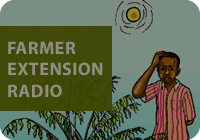Hannah Davis, Farmer Radio Development Manager for the LYF has just got back from Kampala, Uganda where she represented the LYF for the launch of the NIMFRU project (National-scale Impact-based Forecasting of Flood Risk in Uganda).
Led by our partners, the University of Reading’s Walker Institute, this 16-month project aims to improve early warning systems in Uganda and to strengthen flood-prone communities by providing better access to information. Our contribution comes via the LYF’s proven Farmer Radio model, implemented through local NGO partner ECOTRUST in the pilot district of Katakwi, eastern region. Our radio programme content will promote good practice on flood prevention and adaptation for these remote communities.
As always, the radio side of the project will be developed with full participation of farmer listener groups and will combine science, livelihoods analysis and indigenous knowledge into key messages communicated by farmers for farmers on their local radio stations.
Unfortunately, climate change issues (flood, drought, landslides, hailstorms etc) now impact every sector of the Ugandan economy. Studies indicate that Uganda is already experiencing the negative impacts of climate variability; with flash floods, landslides and mudslides being increasingly common. Only last month, sudden intensive rainfall triggered a massive landslide in Bukalasi in eastern Uganda resulting in 46 fatalities and 33 injuries, destroying 186 households and affecting an estimated 1,116 people. Almost every district in the country is now subject to regular flooding, causing wide-spread disruption to people’s lives and livelihoods and destruction of houses and crops. The damage done to major infrastructures such as hospitals and sewage treatment units has the knock-on impact of endangering public health further.
Despite the establishment of a national response policy framework and institutions, current methods used to track and manage flood risk in Uganda are limited. The NIMFRU project brings together stakeholders from national and local government, NGOs, research institutions and advocacy networks. Together, we can pinpoint the exact vulnerabilities of communities – taking account of the different seasons, exposure to different types of flood threat and improving preparedness, communication and response. Katakwi was carefully selected as our pilot site due to its history of flood-related events. Between now and February 2020, the LYF will be working alongside our partners in the region, as together we test the new forecasting and response tools—including the all-important use of radio! After this, the partners will be delivering the evidence needed to scale up the project and to embed it within national policy and institutions.
Hannah Davis and Hannah Clark share the role of Farmer Radio Development Manager for the Lorna Young Foundation.





